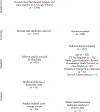Psychological flexibility in older adulthood: a scoping review
- PMID: 35168415
- PMCID: PMC9376200
- DOI: 10.1080/13607863.2022.2036948
Psychological flexibility in older adulthood: a scoping review
Abstract
Objectives: Psychological flexibility/inflexibility (PF/PI) is a core component of the acceptance and commitment therapy (ACT) model, which is gaining more attention in the geropsychological literature. This scoping review examines the size and scope of the research on PF/PI in older adulthood related to age differences between older adult and younger samples, correlates relevant to psychological health, and changes with ACT.
Methods: A systematic literature search was conducted using PubMed, CINAHL, and PsycINFO. Peer-reviewed articles available in English were included that: had a mean age ≥65 and a minimum age ≥60; and reported self-report measures of PF/PI. We categorized PF/PI into three domains: open, aware, and engaged.
Results: Forty-six articles were included. Most studies measured open or aware domains; few measured the engaged domain. Older adults evidenced greater awareness compared to younger adults (9 of 13 analyses were significant). Openness and awareness consistently yielded medium to large correlations with anxiety and depression. PF/PI did not relate with positive affect and inconsistently correlated with quality of life measures.
Conclusion: Despite emerging trends, variability and limitations were evident in the literature. Specifically, measurement issues, lack of conceptual clarity, and the omission of values and behavioral measures require future attention.
Keywords: Psychological flexibility; acceptance and commitment therapy; geropsychology; psychological health; psychological inflexibility.
Conflict of interest statement
We have no conflicts of interest to disclose. These contents do not represent the views of the U.S. Department of Veterans Affairs or the United States Government.
Figures
Similar articles
-
Assessing Psychological Flexibility and Inflexibility in Chronic Pain Using the Multidimensional Psychological Flexibility Inventory (MPFI).J Pain. 2023 May;24(5):770-781. doi: 10.1016/j.jpain.2022.11.010. Epub 2022 Nov 25. J Pain. 2023. PMID: 36442815
-
A Network Analysis Approach on the Psychological Flexibility/Inflexibility Model.Behav Ther. 2023 Sep;54(5):719-733. doi: 10.1016/j.beth.2023.01.002. Epub 2023 Jan 23. Behav Ther. 2023. PMID: 37597953
-
Acceptance and commitment therapy for older people with treatment-resistant generalised anxiety disorder: the FACTOID feasibility study.Health Technol Assess. 2021 Sep;25(54):1-150. doi: 10.3310/hta25540. Health Technol Assess. 2021. PMID: 34542399 Clinical Trial.
-
A scoping review to identify process and outcome measures used in acceptance and commitment therapy research, with adults with acquired neurological conditions.Clin Rehabil. 2023 Jun;37(6):808-835. doi: 10.1177/02692155221144554. Epub 2022 Dec 20. Clin Rehabil. 2023. PMID: 36540937 Free PMC article.
-
The role of the acceptance and commitment therapy in the treatment of social anxiety: An updated scoping review.J Affect Disord. 2022 Aug 1;310:174-182. doi: 10.1016/j.jad.2022.05.008. Epub 2022 May 7. J Affect Disord. 2022. PMID: 35537544
Cited by
-
Exploring Biomarkers of Mental Flexibility in Healthy Aging: A Computational Psychometric Study.Sensors (Basel). 2023 Aug 6;23(15):6983. doi: 10.3390/s23156983. Sensors (Basel). 2023. PMID: 37571766 Free PMC article.
-
Associations between psychological inflexibility and mental health problems during the COVID-19 pandemic: A three-level meta-analytic review.J Affect Disord. 2023 Jan 1;320:148-160. doi: 10.1016/j.jad.2022.09.116. Epub 2022 Sep 28. J Affect Disord. 2023. PMID: 36179778 Free PMC article.
-
Intolerance of uncertainty and psychological flexibility as predictors of mental health from adolescence to old age.Soc Psychiatry Psychiatr Epidemiol. 2024 Dec;59(12):2361-2368. doi: 10.1007/s00127-024-02724-z. Epub 2024 Jul 9. Soc Psychiatry Psychiatr Epidemiol. 2024. PMID: 38981933 Free PMC article.
-
The effects of psychological flexibility and night shifts on mental health and well-being in nurses.PLoS One. 2024 Nov 14;19(11):e0313634. doi: 10.1371/journal.pone.0313634. eCollection 2024. PLoS One. 2024. PMID: 39541325 Free PMC article.
-
The Persian version of the psychological flexibility in sport scale: a psychometric study.BMC Psychol. 2022 Nov 4;10(1):250. doi: 10.1186/s40359-022-00962-x. BMC Psychol. 2022. PMID: 36333755 Free PMC article.
References
-
- *Alonso MA, López A, Losada A, & González JL (2013). Acceptance and commitment therapy and selective optimization with compensation for older people with chronic pain: A pilot study. Behavioral Psychology / Psicología Conductual: Revista Internacional Clínica y de La Salud, 21(1), 59–79. psyh.
-
- Aromataris E, & Munn Z (Eds.). (2020). JBI Manual for Evidence Synthesis. JBI. 10.46658/JBIMES-20-01 - DOI
Publication types
MeSH terms
Grants and funding
LinkOut - more resources
Full Text Sources
Research Materials
Miscellaneous


